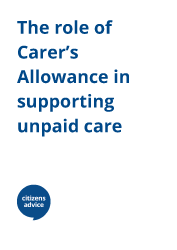The role of Carer's Allowance in supporting unpaid care
The UK’s six million unpaid carers make an enormous contribution to society. It is estimated that unpaid care is worth £119 billion per year , £6 billion more than the planned expenditure for the NHS in 2014/15.
But a growing body of evidence shows that many unpaid carers, including those who claim Carer’s Allowance, are struggling with the financial, social and health pressures that result from taking care of someone on a full time basis.
In the last Parliament there were some improvements for full time unpaid carers.
The claiming process for Carer’s Allowance has been simplified and moved online, and the introduction of the Care Act now means that people who appear to have caring needs will be entitled to an assessment, and offered support from the local authority if they meet the eligibility criteria.
In this Parliament, the Government has pledged to increase support for full time unpaid carers. But there is little clarity over what this means for the future of the main benefit for carers.
Carer’s Allowance is a crucial element of our welfare system. Research shows that it is a vital component of household income, it helps people care for relatives or friends, and it provides a sense of worth for carers who work hard and take pride in the recognition it gives them.
Any changes to entitlement or support levels would have significant implications for individuals and families who are already trying to cope with the practical and financial challenges of ill-health or disability.
This brief report covers the purpose of Carer’s Allowance and its importance to those who receive it.
It explores the challenges that we currently see at Citizens Advice; issues around eligibility, entitlement and calculation; carers who are struggling financially; the lack of responsiveness of the welfare system when carers experience a change in circumstances; issues around balancing part-time employment and caring; and worsening physical and mental health for carers.
The report goes on to discuss the potential impact if any changes are made to the benefit in the future.


